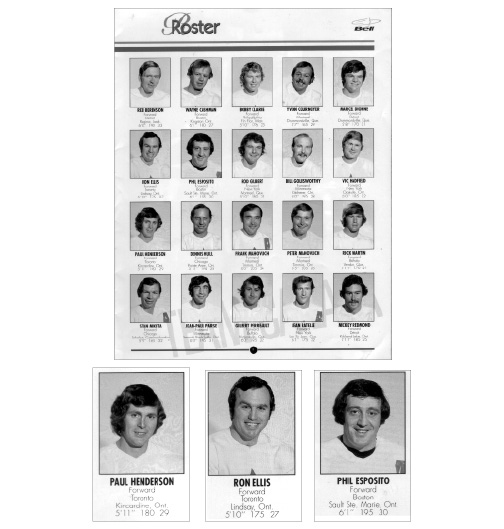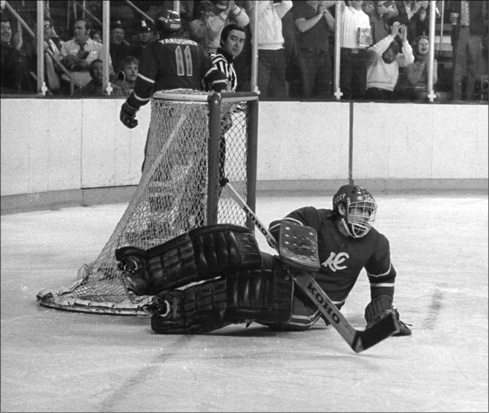

This long-awaited series was between the best Canadian professional players in the NHL and the best amateur players in the world, the Soviet Union (USSR) who were the perennial World and Olympic champions. They started their four-game Canadian portion in Montreal, where the Soviets stunned Team Canada (and all Canadians) by beating them in the first game and taking home to Moscow a lead of two wins, one loss, and one tie.
Phil Esposito was the inspirational leader for Canada. He blasted Canadian fans for booing the Canadian team and this act rallied both the team and country.
The series electrified Canadians for several weeks, and on September 28, 1972, over 85 percent of Canada was tuned in to the historic eighth game played in Moscow. Paul Henderson scored the series game winner for Canada, much to the collective relief of most Canadian hockey fans. It was our game, and we just about lost it. Ask anyone from that generation where they were when Paul Henderson scored that goal, and they will instantly be able to tell you.

Team Canada, Summit Series with the Soviets, 1972.
Paul Henderson, Ron Ellis, and Phil Esposito.
Hockey Hall of Fame
In the eight-game series, Paul actually scored the game-winning goal in both games six and seven, as well as the famous eighth game. Both he and another star player in the series, Ron Ellis, are great guys, and I enjoy running into them on the golf course on occasion.
For goalie Ken Dryden, whose NHL career would produce six Stanley Cups, this series proved to be the highlight of his career. “Team Canada,” Dryden noted, borrowing a phrase from Winston Churchill, “endured the feeling of being shot at and missed.” Totally spent at the end, victory brought relief as this country rose to its feet in total euphoria.
Ironically, both Canada and the USSR had the best hockey players in the world playing in this series and they used amateur referees. The Soviets figured NHL refs could not be impartial arbitrators. It took fifteen years before they allowed NHL referees of Canadian ancestry to officiate at Canada–Russia games in the Canada Cup showdowns. The European referees were unaccustomed to the pressure games of this magnitude, and the 1972 Series came close to all-out war at times.

Paul Henderson — the winning goal in game eight, Moscow, 1972.
Canadian Press Archives
I have a treasured picture of Team Canada 1972 autographed by many of the players, and am proud to say I have been able to skate beside all of them on the ice and can name most of them friends.11
In the aftermath of the historic 1972 Canada–Soviet Summit series, Soviet teams made several trips to North America to play exhibition games against NHL teams. Believe me, they were not called the “Friendship Games.” Both sides wanted to win. The New Year’s Eve 1975 game in Montreal, featuring the Red Army team, was a classic. The Canadiens ended up playing to a 3–3 tie in a game they should have won.
I recall doing a game in Buffalo several nights later, when the Sabres played the Soviet Wings. This game was just one of eight in the Super Series staged in late 1975 and early 1976. It featured the Red Army club, along with the Wings of the Soviet, playing NHL teams in their home buildings. The NHL clubs won two of the eight games. The tour was a stretch for the Soviets, both in distance, from the safe confines of the Kremlin, and in philosophy. If the truth be known, it had more to do with money than doctrine. Prior to the game in Buffalo, everyone around the rink, at least from our side, was just a little uptight. The NHL was getting its collective ass kicked, and not one team from our side was showing the Soviets that we were supposed to be the best hockey players around.
Being an impartial arbitrator, I could not really get too emotionally involved either way. I had to view it as just another game. The game was a doozer! The Sabres came out hitting, trying to slow their faster opponents down. Big Jerry Korab of the Sabres slammed a Soviet player so hard into the boards that the end gate opened, and the Soviet player ended up skidding under the parked Zamboni. The Sabres won 12–6, and Mr. Campbell, the NHL president, said, “That puts things back into its proper perspective.”

The Soviets at Buffalo, New York, 1976.
Shaver Studio, Tonawanda, New York
11 The NHL would not allow any of the former players who had just “defected “ to the upstart WHA (Bobby Hull, Gerry Cheevers, and several others) to play in this historic Summit Series, thereby drawing the anger of the Canadian public, especially after Canada lost two of its first four games at home.